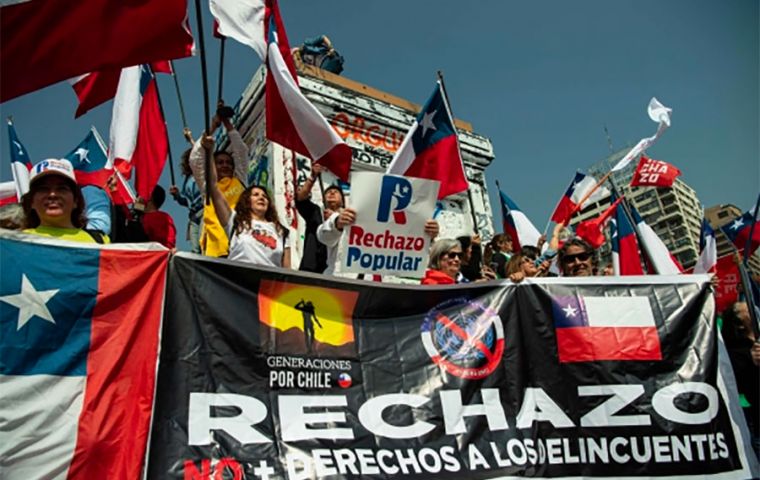MercoPress. South Atlantic News Agency
Chile's planned Constitution still not likely to survive plebiscite
 The so far doomed Constitution would mean the victory of violent 21st Century socialism, according to rejection groups
The so far doomed Constitution would mean the victory of violent 21st Century socialism, according to rejection groups Chile's planned new Constitution seems to be heading for failure in the upcoming September 4 referendum, according to the latest polls, which show up to 56% of the citizenry would vote against it, between 4 and 12 percentage points above those who would approve it.
Hence, the text penned under Dictator Augusto Pinochet in 1980 -although it did undergo some changes since the end of the military regime- would remain in force.
The latest polls also show between 10 and 15% of undecided voters who might sway either way at the latest minute, while in the streets there is a marked citizen mobilization in favor of approving the document.
Over 15 million Chileans are eligible to vote next Sunday, in the first call since 2012 in which voting will be mandatory and absentees are to be fined.
Those in favor of rejecting the draft cite their opposition to shifting from the current reduced State, which prioritizes private investment, towards a welfare State, with a wider range of fundamental rights, which have been praised by communities such as the indigenous, the lbgt+ movement, the feminists and other progressive groups, who speak of “a leap forward”.
Among the most controversial proposals are “plurinationality”, or recognition of different indigenous nations and native peoples; the establishment of a Council of Justice instead of the Judiciary, with a special indigenous justice system; and the right to abortion.
Rejection thus means the preservation of the status quo, which includes the economic conditions that made Chile the preferred South American destination for migrants from Venezuela or Haiti.
Other opposers to the new reforms argue that the constituent process is a transnational strategy to destroy the State and confront the Chilean people by replacing the country with a “plurinational state” of 11 indigenous nations, which would entail the disappearance of “equality before the law”, of “private property” and other issues already legal in Cuba, Venezuela, and Nicaragua.
The constitutional plebiscite is the last phase of a process that began with the National Plebiscite of 2020, which stemmed from the violent pressure of 21st Century Socialism which seeks to turn a specific administration's problem into a state conflict to convert a minority into an absolute majority, which all these new rights would prove, according to rejection groups.




Top Comments
Disclaimer & comment rulesCommenting for this story is now closed.
If you have a Facebook account, become a fan and comment on our Facebook Page!